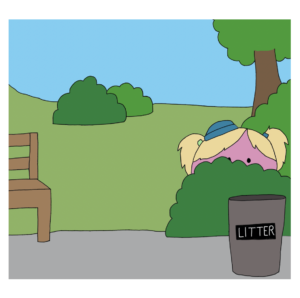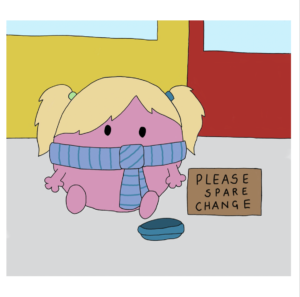Harriet is an ESRC funded PhD student from the Geography department, just entering into her second year. Her research focuses on homeless women and their gendered experiences and issues.
I am just entering my second year of my PhD in Human Geography. Contrary to stereotypes involving maps and colouring in, geography is an exciting and broad discipline which allows us to study the earth and the people and/or processes within it. Human Geography in particular allows us to focus on people, including those who face oppression and marginalisation. My own research focuses on homeless women: a group who are often overlooked and their needs forgotten about. Homeless women are often neglected in homelessness research, alongside issues such as survival sex, sex work, menstruation and sexual assault. The existing research on this topic paints a bleak picture for homeless women, emphasising the need to better understand these experiences so we can better support these women.
I created Little Miss Homeless a little over a year ago. I wanted to culture jam the Mr Men series to bring attention to this important, yet under discussed issue. I wrote and illustrated the book myself, drawing on real life stories from women I’ve worked with and research from academics and larger organisations such as Crisis or Shelter. The juxtaposition of a simple, cheerful children’s book with the harsh realities of women’s homelessness resulted in a powerful tool which could be used to communicate these issues to the public in an accessible way.
The response to the book has been incredible. Since it was released, it’s reached around 1500 people – and that number goes up each day. I’ve done multiple interviews with different journalists including one live on BBC Radio Devon. The Big Issue has also covered the book, posting it all over their social media and even printing it in their latest magazine! I’ve had so many lovely emails and am consistently met with support from people on twitter. It’s been overwhelming in the best possible way! Most importantly to me though, has been the response from those who work in this sector. Their approval of the book is particularly special as they work with these women on a daily basis, so knowing that I’ve accurately represented their struggles is great. I never imagined the book reaching such a wide and varied audience, and I am so excited that so many people are becoming more aware of the issues homeless women face.
Yet, spreading awareness of these issues is only the start. In order to make meaningful change in the lives of homeless women, we need to better understand these issues and their experiences of homelessness. This is what I hope to address through my PhD research. Improving understandings of homeless women will mean we can better support them in the future.
Written by: Harriet Earle- Brown



